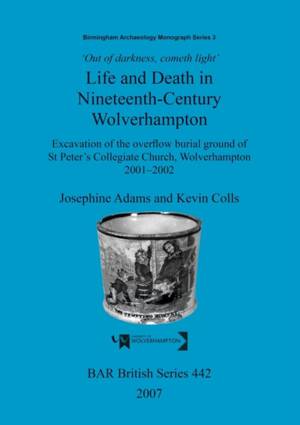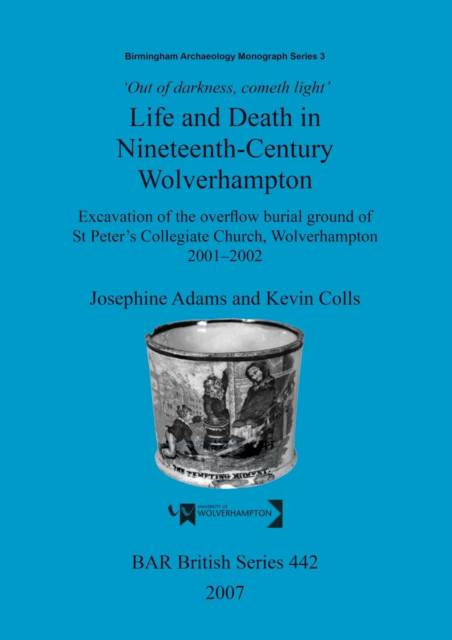
- Retrait gratuit dans votre magasin Club
- 7.000.000 titres dans notre catalogue
- Payer en toute sécurité
- Toujours un magasin près de chez vous
- Retrait gratuit dans votre magasin Club
- 7.000.000 titres dans notre catalogue
- Payer en toute sécurité
- Toujours un magasin près de chez vous
'Out of Darkness, Cometh Light'
Life and Death in Nineteenth-Century Wolverhampton
Josephine Adams, Kevin CollsDescription
Excavation of the overflow burial ground of St Peter's Collegiate Church, Wolverhampton 2001-2002
Birmingham Archaeology Monograph Series 3
Between October 2001 and January 2002, Birmingham University Field Archaeology Unit (now Birmingham Archaeology) carried out archaeological explorations on the overflow burial ground of St Peter's Collegiate Church, Wolverhampton, in the English Midlands. The excavations revealed evidence of activity prior to the use of the area as a burial ground. Two pits and a gully were found, highly truncated, but may be associated with the grounds of a Deanery, which stood in this area during the medieval period. The excavations recorded 152 human burials, dating to the mid-19th century. The majority of the burials were found with scant remains of wooden coffins and had been subject to the intercutting of graves and truncation by later building activity. Seven brick vaults were found, six of which had been emptied, probably during an earlier graveyard clearance. The intact vault and earth-cut burials were found in the south-eastern part of the development site, which appeared not to have been cleared. The preservation of human bone was generally good, despite the high levels of truncation. The sample provided a good opportunity for research into the health and lifestyles of the local population. Anthropological analysis was carried out on 150 skeletons, revealing some striking results. An assessment of the pathology of the skeletons revealed a wide variety of diseases, conditions and trauma, including cases of tuberculosis, osteoarthritis, infectious diseases, syphilis, malignant tumours, and dental diseases. The archaeological evidence, scientific analysis of the skeletal remains, and the documentary research provide an important basis from which to reconstruct the lives and deaths of the people living in central Wolverhampton during the 19th century. The authors hope this project will help to demonstrate the usefulness of such assemblages and the wealth of information that can be gleaned from archaeological, scientific, and documentary analysis.
With contributions by Iraia Arabaolaza, Lynne Bevan, Anthea Boylston, Gary Coates, Leonie Driver, Rowena Gale, Annette Hancocks, Emma Hancox, Erica Macey-Bracken, Charlotte Neilson, Paola Ponce, Stephanie Ratkái and Sarah Watt. Illustrations by Nigel Dodds and Kevin Colls.
Spécifications
Parties prenantes
- Auteur(s) :
- Editeur:
Contenu
- Nombre de pages :
- 114
- Langue:
- Anglais
- Collection :
- Tome:
- n° 442
Caractéristiques
- EAN:
- 9781407301235
- Date de parution :
- 15-12-07
- Format:
- Livre broché
- Format numérique:
- Trade paperback (VS)
- Dimensions :
- 208 mm x 292 mm
- Poids :
- 408 g







